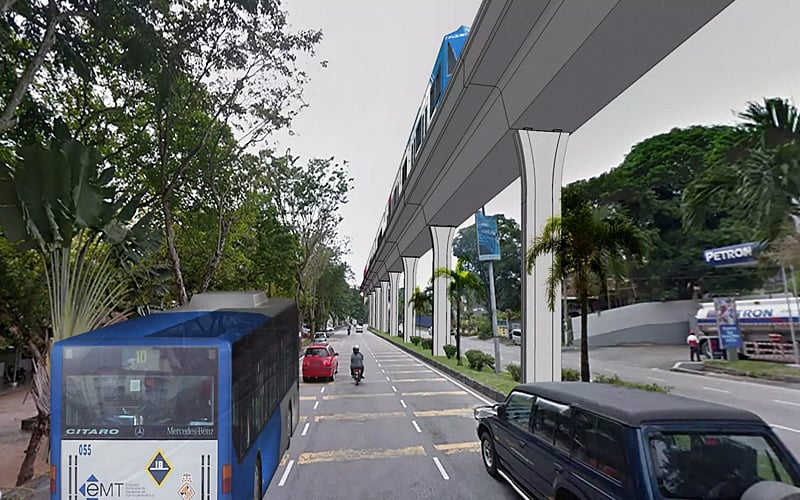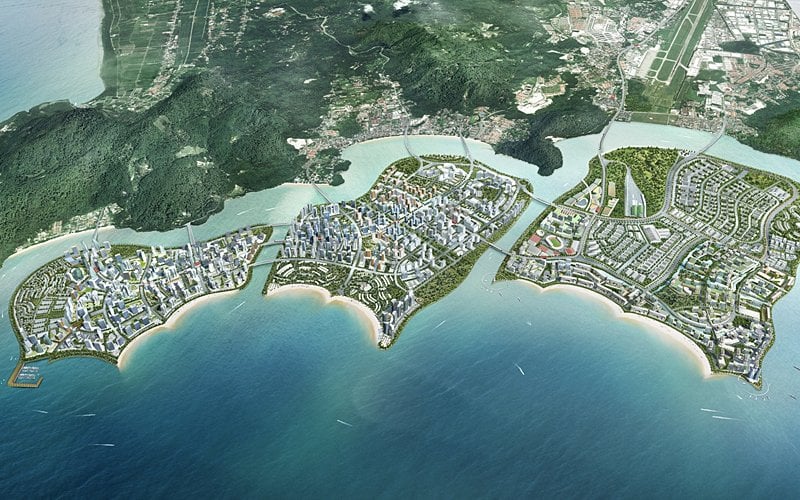
PETALING JAYA: Following Prime Minister Anwar Ibrahim’s announcement that the federal government will fund the Penang light rail transit (LRT) project, questions have been raised regarding the impact this would have on the controversial Penang South Islands (PSI) project.
In a note today, MIDF Investment Bank Bhd said “clarity is needed on the nitty-gritty”, which could be expected when Anwar discusses the matter with the state government.
MIDF analyst Royce Tan noted the 26.8km elevated Komtar-Bayan Lepas line with 23 stations was estimated to cost RM9.5 billion.
This would have been funded by proceeds from the PSI reclamation project, which received the environmental impact assessment (EIA) approval last month.
“In light of these new developments, these are some matters that will need to be sorted out between both the federal and state governments, and also its project delivery partner SRS Consortium Sdn Bhd,” said Tan.
Gamuda Bhd holds a 60% stake in the consortium and the remaining 40% is held equally by Loh Phoy Yen Holdings Sdn Bhd and Ideal Property Development Sdn Bhd.
Impact on PSI
Since Anwar’s announcement of the federal government’s funding for the LRT line last Saturday, many have voiced their opinion on the reclamation project and questioned its need.
“To ease the issues arising from the island reclamation, the project (PSI) will be reviewed so that its scope can be reduced,” said Anwar.
However, some believe that reducing the project’s scope is not enough. Transport consultant Rosli Azad Khan previously told FMT “there is no justification for PSI to continue” if it is no longer needed to fund the rail project.
Previous estimates had put revenue from land sales of Island A at around RM8-9 billion.

Gamuda Engineering is slated to be the turnkey contractor (TC) for the Phase 1 Island A reclamation works.
“(The) immediate order book value for the initial reclamation works was estimated at RM5 billion based on guidance earlier in March 2021 and our latest checks with management,” said RHB analyst Adam Rahim.
In a recent note, Adam said total net earnings from the land sale is RM515 million or RM74 million per year (over a seven-year period) and would begin to be recognised from FY2026 onwards after reclamation is completed.
Public Investment Bank Bhd (PublicInvest) analyst Avery Chin told FMT Business that any scaling down would definitely reduce the earnings generated from land sales. However, a smaller project would also lower costs for Gamuda.
In a separate note on April 27, PublicInvest had anticipated state-level EIA approval to take another three to four months, with reclamation commencing in Q4 FY2023.
“We estimate net profit recognition of RM304 million-RM342 million from the reclamation works, assuming a 10% pre-tax margin,” it said.
“We retain our forecasts and TP (target price) of RM5.10 unchanged as we have accounted for this project into our FY2023-FY2024F order book replenishment assumption,” it said.
Nonetheless, a reduction in land sale revenue was unlikely to have very material impacts on the group.
Chin added that PSI is just an additional project to Gamuda, and was not a driver of income.
What about the other LRT lines?
On top of this, MIDF’s Tan raised questions about the other LRT lines included in the Penang Transport Master Plan (PTMP) project.
“Is the federal government fully funding the entire LRT project or only the first phase?” asked Tan.
Other lines include the Ayer Itam Line (13km, 13 stations), Tanjung Tokong Line (7km, eight stations), George Town-Butterworth Line (18km, eight stations), Raja Uda-Bukit Mertajam Line (28km, 21 stations) and its extension to Kepala Batas (13km, 10 stations).
Lastly, there is the Permatang Tinggi-Batu Kawan Line (14km, 15 stations) with extensions to Bukit Tengah-Seberang Jaya (15km, 17 stations) and to Nibong Tebal (11km, six stations).
Chin said there was uncertainty about who would be in charge of constructing these other lines as well.
“Looking at the government’s fiscal deficit position, this LRT is going to cost another RM8 billion (or more) which I don’t think will look good on the government.”
She added that if the government were to be involved in the funding of the other lines, it would likely be a partial funding only.
“If it (the LRT project) is executed this year, then earnings would be recognised next year. I foresee it (could) probably add 6% to (Gamuda’s) bottom line,” she said.
However, there would be limited impact on the counter’s valuation as virtually all the positives were already priced in.
At the close of trade, Gamuda’s share price was flat at RM4.10, giving it a market capitalisation of RM10.91 billion. - FMT



No comments:
Post a Comment
Note: Only a member of this blog may post a comment.